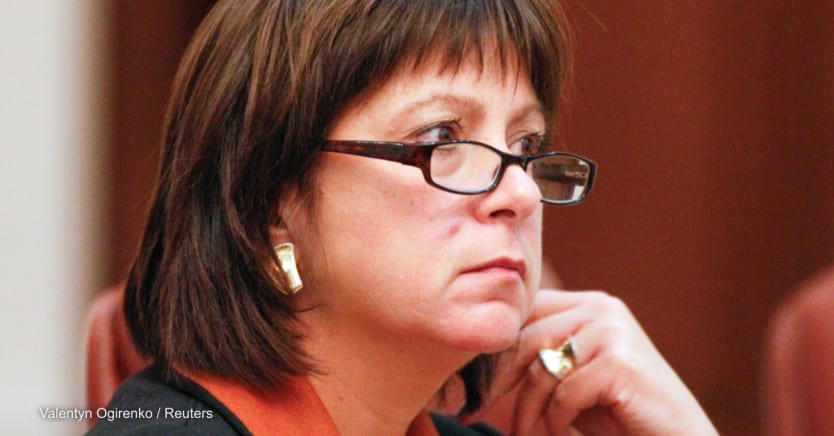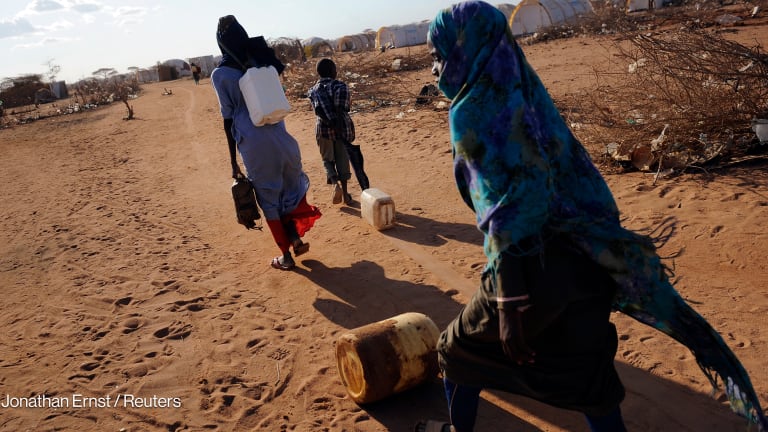How to sustain Ukraine's economy for the next 6 months — and beyond

Natalie Jaresko is no stranger to managing an economy through periods of crisis.
As Ukraine’s finance minister from 2014 to 2016, she led the negotiation and implementation of what was the largest International Monetary Fund program in the institution’s history to that point — all while Russian troops occupied Crimea and eastern Ukraine.
After that role, Jaresko, who was born in the United States and began her career at the U.S. State Department, was tapped to lead the restructuring of Puerto Rico’s $70 billion in public debt, as executive director of the Financial Oversight and Management Board for Puerto Rico.
Since stepping down from that post in April, Jaresko’s focus has been back on Ukraine.
She now leads a campaign called Stronger Than Ever to raise money — and match it — for medicine and medical supplies. She is also keenly aware of the challenges facing the country as its war with Russia nears the six-month mark, amid dire projections of the conflict’s toll on Ukraine’s economy and on people’s livelihoods and health.
Jaresko spoke to Devex about Ukraine’s immediate challenges, how the international community should be assisting, and what must be done to prepare for what she says will be “the largest reconstruction project in our known history.”
This conversation has been edited for length and clarity.
“[Rebuilding Ukraine] is probably going to qualify as the largest reconstruction project in our known history.”
— Natalie Jaresko, lead, Stronger Than EverIf you were Ukraine’s finance minister right now, what would you be doing to mitigate the biggest drivers and consequences of poverty for the Ukrainian people? And what would you be asking the international community to do?
The only solution … is an end to the war. You hear everyone in the Ukrainian government simultaneously saying “weapons, weapons, weapons.” To some extent, that's true. That is the only way to stem the decline in GDP [gross domestic product], to reopen and reenergize the economy, to provide people with jobs, to house people, and to provide pensions. You must end this war as soon as possible, and you must prevail.
Secondarily … I would be focused on ensuring the macrofinancial stability for the next six months. Ukraine is running a budget deficit of about $5 billion a month, and the Western community of partners committed about $30 billion, which covered about six months. … So we're going into the winter, and we have no credible plan in place — or at least not one that's public — on how to get through the next six months.
And the reason that's important to avoiding further impoverishment is because if you think about what the budget of Ukraine is about today, aside from paying your soldiers, it's about pensions, [and] it's about the subsidy to each of the 6 million internally displaced people. It's about health care workers and their salaries. It's about the most essential critical services. And so being assured that those funds are available would be my No. 1 concern right now, and that's just to avoid a further decline.
What's your assessment of the approach that international institutions have taken so far? Are you seeing the kind of creativity from them that you think is needed?
No. The World Bank and the IMF, who have the deepest pockets, have basically said they’re out of credit space for Ukraine.
People have to think out of the box. … I don't think those institutions are terribly creative, typically, but they've proven that they can be. The IMF during COVID proved that it could be. Individual government donors can be creative and have been creative in different times and spaces.
How do the immediate needs that you're describing fit together with longer-term planning around reconstruction?
Everything I've talked about is more urgent, immediate. Then there are two stages of reconstruction — one that is urgent now that we haven't talked about, that is not in that $5 billion a month. Every time we regain a territory, you have to rebuild basic infrastructure. You have to put bridges back. You have to get the heat, electricity, and water on, and potentially housing — at least temporary housing. No one has been thinking about how to do that in the donor community, the more urgent reconstruction.
And then there's the big picture, which people assume is postwar or at least [after the current level of insecurity]. That's, I think, hundreds of billions of dollars. … It should be a mixture of pools: credit, private investment, confiscated Russian assets, grant aid as well. I think that is probably going to qualify as the largest reconstruction project in our known history.
Given that the war is still very much ongoing, is it premature to talk about reconstruction in Ukraine?
No. It's not premature because, No. 1, it is such an enormous scale that needs to be planned [and] No. 2, coordinated. No. 3, confidence-building measures [must be] installed, whether it's on procurement or other. So it's going to take some planning.
And it's important to discuss it now to create confidence in Ukraine — with Ukrainians who are fighting this war for all of us — that we're there for them.
It's important to convey that message to Russia: that we are going to take your assets, we are going to use them, because you caused this destruction — continue to cause destruction, continue to create increased costs. We will continue to look for more reparations from you. There is a continued cost of this war.
It's going to take time to raise the capital and organize. The Marshall Plan, frankly speaking, started years after [World War II] was over. I would not want that to be the case [for reconstruction now]. You have 8 million refugees in Europe who we want to come home, and we want to give them confidence that they will be coming home — to homes, schools, and jobs. That's important for Europe and the European economy. That's important to those people.
What is the current status of that reconstruction conversation, and what needs to happen next?
The plan, the vision needs to come from Ukraine. They've come up with a wide number of projects and things like that. They have a clear vision as to wanting to leapfrog [in development]. Technology is making the country more digitized.
There's more that needs to be done on urban planning, urban development, best practices for rebuilding communities. There needs to be a lot more thoughtfulness as to where people will move back to. You have that in every disaster situation. You don't sometimes repopulate towns that are almost in the flood zones. You don't necessarily repopulate every town. You don't rebuild every school. You might rebuild differently. How differently? Why?
The really critical piece for Ukraine is how you engage civil society in that. Ukraine is decentralized in many ways. We're in martial law now. It's not [decentralized] now — but before the war, very decentralized.
So mayors, governors, communities are going to have to be involved in an iterative process of discussions about how they want to rebuild, what they want to rebuild, how they view their economy. And that takes time. Those town halls take time. The organization of those conversations takes time. … Again, [this situation is] the most complex thing I think I've ever seen. Puerto Rico was tough, but [that is] a 100-mile-wide island.
How would you characterize the government of Ukraine as a partner in that kind of massive and, ideally, highly coordinated undertaking that you're describing?
I think the Ukrainian government is more than capable of coordinating, agreeing. ... It isn't a country like Haiti after the earthquake, which has no government institutions. What this war has proven is that government institutions, governance in Ukraine, is quite resilient.
This isn't about the West dictating to Ukraine. I don't think that will be acceptable to Ukraine, especially given how they've proven themselves during this war to be self-sufficient, self-governing, and again, the strength of their institutions, notwithstanding the war. So I think the international community is going to have to understand better how to collaborate and cooperate and work together with Ukraine.
Search for articles
Most Read
- 1
- 2
- 3
- 4
- 5








